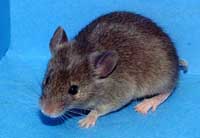Strain Data Sheet
RBRC00097
Strain Information | |
|---|---|
| Image |  |
| BRC No. | RBRC00097 |
| Type | Spontaneous Mutation Congenic |
| Species | Mus musculus |
| Strain name | C3H-Ttf/t<0>+ |
| Former Common name | C3H-Ttf/t<0>+ |
| H-2 Haplotype | |
| ES Cell line | |
| Background strain | C3H/HeN |
| Appearance | agouti |
| Strain development | Maintained by National Institute of Genetics. |
| Strain description | T, Brachyury, semidominant, Chr 17. t, t-complex, recessive, Chr 17. T/T homozygous embryos die at 10 days of gestation due to failure to form a normal mesoderm. T/+ heterozygote have a shortened tail and abnormal sacral vertebrae. T/t mice are tailless. tf/tf homozygous mice show repeated waves of hair loss and regrowth. tf gene is linked to the T/t complex. |
| Colony maintenance | Sibling Mating (T: Heterozygote xHeterozygote; t: Heterozygote x Heterozygote, tf: Heterozygote x Hetrozygote) |
| References | |
Health Report | |
|---|---|
| Examination Date / Room / Rack | |
Gene | |||||||
|---|---|---|---|---|---|---|---|
| Gene Symbol | Gene Name | Chr. | Allele Symbol | Allele Name | Common Names | Promoter | Diseases Related to This Gene |
| Itpr3 MGI:96624 | inositol 1,4,5-triphosphate receptor 3 | 17 | Itpr3<tf> MGI:1857070 | tufted | |||
| T MGI:98472 | brachyury, T-box transcription factor T | 17 | T MGI:1856184 | brachyury | |||
| t MGI:105076 | t-complex | 17 | t<0> MGI:1856730 | t, 0 | |||
Phenotype | |
|---|---|
| Phenotype annotation from literatures by Mammalian phenotype ontology | more 68 phenotypes |
| Detailed phenotype data | |
Ordering Information | |
|---|---|
| Donor DNA | |
| Research application | |
| Specific Term and Conditions | No specific terms and conditions. (The DEPOSITOR waives its own rights under any patents, intellectual property, or other proprietary rights with respect to the results to be obtained by use of the BIOLOGICAL RESOURCE.) |
| Depositor | Toshihiko Shiroishi (National Institute of Genetics) |
| Strain Status |  Frozen embryos Frozen embryos |
| Strain Availability | Recovered litters from cryopreserved embryos (2 to 4 months) Cryopreserved embryos (within 1 month) |
| Additional Info. | Necessary documents for ordering: |
BRC mice in Publications |
|---|
| No Data |